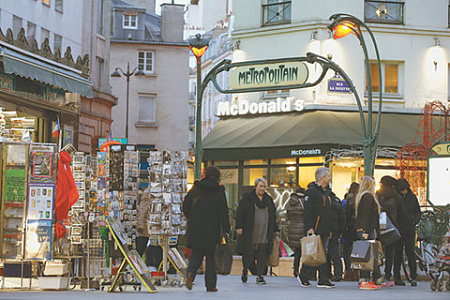
In France, groups appeared on several social networks at once, collecting signatures of those who agree not to buy American goods in protest against the actions of Donald Trump. This refers primarily to the upcoming increase in duties on products manufactured in the EU starting from April 2. The idea of a boycott has massive support, according to sociological data. Another thing is that it will be difficult to implement it in practice. There are too many made in USA products in Europe, they have become too firmly embedded in the lives of European buyers.
One of the notable characters in French television and radio news was 33-year-old farmer Edouard Rousset. He was the first to register a petition calling for not buying American goods. In his interviews, Rousset explains that he was initially guided by purely political motives. He does not like the Trump administration’s policy towards Ukraine. But very soon he became convinced that the French who signed the petition were more concerned about economics than politics.
The United States and France will soon find themselves in a trade war situation. In early April, the White House increased duties on European goods, in particular on steel and aluminum. In response, the European Union announced a symmetrical measure for products manufactured in the United States. Duties are also being increased on Trump’s favorite alcoholic beverage, bourbon. This hurt him so much that he was going to raise duties on all alcohol from the EU by 200%. If the threat is implemented, French winemakers will lose a valuable market. Thousands of farmers, such as Rousset, who grows hops and grapes, will be affected. And the wine industry, which is already going through difficult times, risks plunging into crisis altogether.
The European Commission is bustling. She has to adjust to the White House. Ursula von der Leyen and her assistants are ready to negotiate compromises, Bloomberg reported. As a compromise with Trump, the Europeans can lower a number of standards, as well as additionally invest in the American economy. There is no unity within the European Union on how to respond to the actions of the Americans. For example, they are trying to moderate the ardor of Brussels in Dublin. The Irish do not want to lose the American alcoholic beverage market because of the political aspirations of the European commissioners. The Italians take a similar position, and the country’s Prime Minister, Giorgia Meloni, continues the policy of maneuvering between Washington and Brussels. But even if a compromise can be found, the EU’s relations with the United States will still be dealt a serious blow.
The situation is aggravated by the form in which the Americans make economic claims to their allies. It’s not enough that people from Trump’s team, especially his billionaire adviser Elon Musk, directly or indirectly interfere in the political affairs of European countries, pointing out who Europeans should or should not vote for, and what policies their governments should pursue. The US Embassy has threatened to terminate contracts with French companies cooperating with the US government if they do not comply with “all federal anti-discrimination laws” aimed at protecting “traditional American values.” This wording, which leaves room for interpretation, is contained in a paper sent by American diplomats to dozens of firms. The U.S. Department of Foreign Trade has protested. The question here is not whether it is right or wrong to pursue a leftist progressive agenda, but whether it is acceptable for the White House to blackmail businesses, especially foreign ones, by forcing them to pursue an ideologically similar corporate policy in exchange for continued cooperation on government contracts. Similar letters demanding to report within five days were sent by the US embassies to firms in several other EU countries. There is even Belgium, where the headquarters of the European Union is located.
A boycott of American goods, albeit partial, already exists in one country – Canada, the very one that Trump threatens to make a new US state. The French are also picking up this trend. Six out of ten French people are in favor of a boycott. And a third of the French are already trying not to buy American goods, according to a survey commissioned by the newspaper Liberation. Companies and brands such as Coca-Cola, McDonald’s, Tesla, Starbucks, KFC and the social network X are under particular attack, British media say. Another survey showed that the French are much less attracted to the prospect of studying, working and living in the United States. Although young people are less willing to reject American goods than their parents, they are also more likely to show their disappointment in the United States as a place where they want to live and emulate.
However, the boycott of American goods has not yet become such a widespread phenomenon as to become a factor affecting the US economy. It’s not just that the French have only recently begun to abandon purchases made overseas. There is always a big difference between declarations and actions. This is especially true when it comes to such American-made consumer goods familiar to Europeans as household appliances, smartphones, sneakers and clothing. They are used to them, sometimes there are simply no analogues in the EU countries, besides, they are sometimes cheaper than European products.
Nevertheless, a blow to the American economy can be inflicted, especially if the White House fulfills all its threats in full. It should be noted here that the boycott was supported to a greater extent by older and more educated French people. The same category of the population is among the most solvent.
Whether there will be a massive boycott of American goods or not, one thing is obvious. Trump, perhaps unwittingly, is spreading his isolationist views to European allies. Europeans are increasingly advocating primarily for their own interests, rather than for global interests shared with the United States.
